All Outbacks sold worldwide are equipped with all wheel drive as standard equipment, the only drivetrain setup available.

2008 Subaru Legacy 2.5GT Wagon

2008 Subaru Boxer Turbodiesel
Sales exceeded expectations, with Tim Mahoney, Senior Vice President of Subaru of America stating "[the Outback] saved our company."
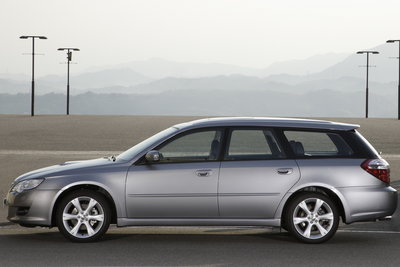
2008 Subaru Legacy Wagon
Subaru introduced the Outback to Japan as the Legacy Grand Wagon–then renamed Legacy Lancaster in model year 1997. In 2004, the Outback name was adopted worldwide and moved to its own model line (except in Japan). All vehicles in the Outback line are derived from Subaru's Legacy, except the Outback Sport (aka Impreza Outback), which is derived from the Impreza hatchback.
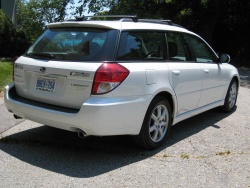
2009 Subaru Legacy Wagon PZEV.
Some credit Subaru for inventing the crossover genre with the Outback, while others point to it as the first in a resurgence of a class of vehicles that started with American Motors' Eagle wagon, launched in 1979.

2008 Subaru Legacy First

2008 Subaru Legacy 2.5GT Wagon
The Legacy Outback was formally introduced to the North American market at the 1994 New York Auto Show, and was known in Japan starting August 1995 as the Legacy Grand Wagon, and in Australia as the Outback, a trim package with normal ground clearance but an "SUV look" with two-tone paint and fog lights. For the 1994 model year, the Legacy wagon in the North American market was available as the Alpine Sport and Sun Sport, which were Value Option Packages included on the "L" trim level wagon, and graphics denoting the option package installed. In Japan the Legacy wagon was called the Legacy Touring Wagon so the Grand wagon nomenclature was meant to signify a more grand, luxurious approach to equipment offered. The exterior was designed by Olivier Boulay, who was hired by Subaru on a short-term basis.
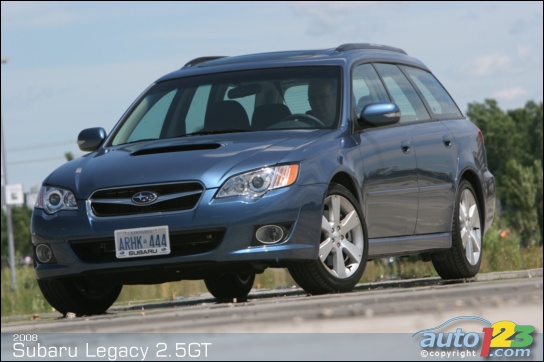
2008 Subaru Legacy 2.5GT Wagon
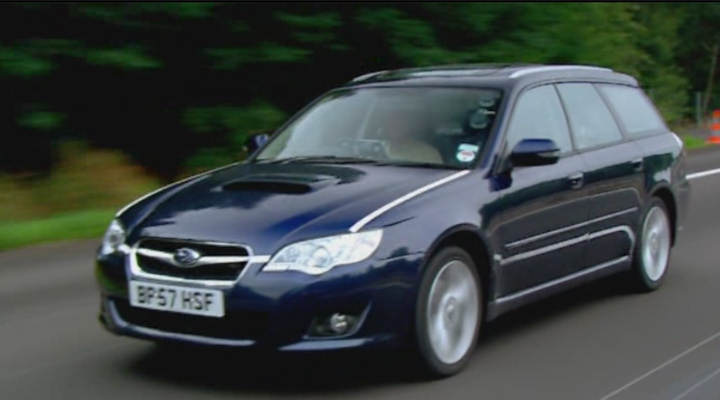
2008 Subaru Legacy R Boxer TD

2008 Subaru Legacy GT Wagon
In 1995, the first year the Outback was introduced, the Outback was a trim package on the base model Legacy wagon "L", that primarily consisted of the heavy cloth interior, berber carpet floor mats, a luggage rack and fog lights with a standard height suspension. This approach was also used on the smaller Impreza wagon, with the name Outback Sport. When the 1996 model year arrived, it gained more aggressive appearing front bumper covers, with larger rallye inspired driving lamps replacing the previously installed fog lights, taller tires with more aggressive tread, and a 7.3 in (185 mm) ground clearance, with a 7.87 in (200 mm) ground clearance in Japan. The more aggressive appearance was also used on the smaller Outback Sport while omitting the increase in ground clearance from suspension modification. This approach was inspired by the Legacy having been entered into international rallying and long distance racing events, and winning the 1990 Safari Rally in the Group N category.

2006 Subaru Legacy Station

2004-Subaru-Legacy-Wagon-005
The previous generation Legacy wagon had an optional air suspension, which allowed the driver to temporarily increase the vehicle's ground clearance, however the permanent increased ride height used on the Outback proved to be more practical. Subaru sales had been declining up until that point in North American market. With the help of clever marketing, a trim level called the Outback intent on making the Subaru a more capable multi-terrain vehicle offered an affordable and fuel efficient alternative to the popular SUVs that were outselling Subaru's traditional offerings. The Legacy and Outback wagons were built at the Subaru of Indiana Automotive production facility in Lafayette, Indiana that also manufactured the Isuzu Rodeo and the badge engineered Honda Passport, traditional SUVs with transfer case installed four-wheel-drive and an extended ground clearance.

2008 Subaru

Swotti - Subaru Legacy, The
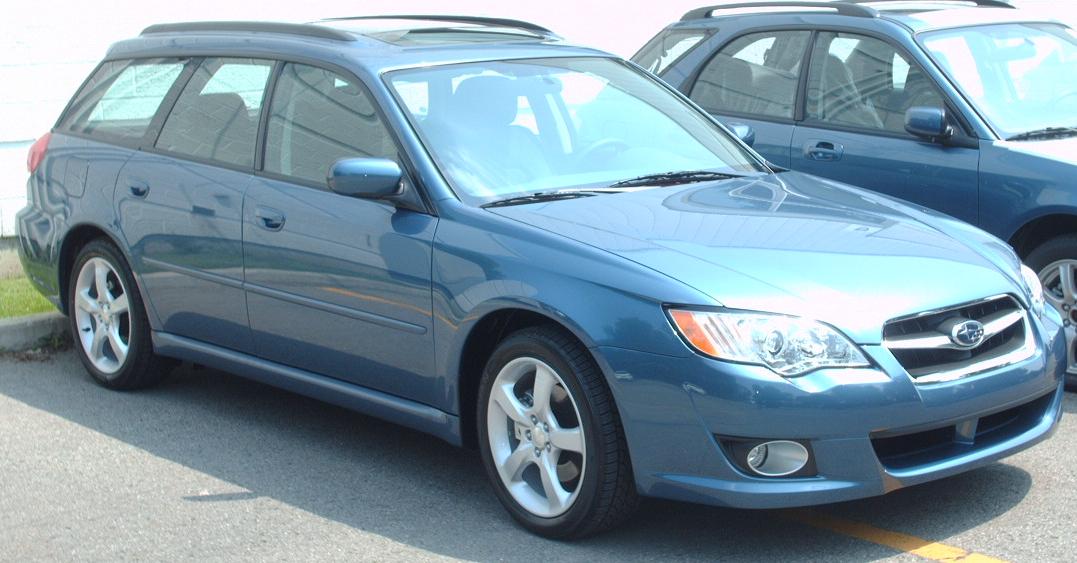
File:2008 Subaru Legacy Wagon.

Car wallpapers Subaru Legacy

Subaru Legacy Wagon S402 -

2008 Subaru Legacy 2.5GT Wagon

2008 Subaru Boxer Turbodiesel
Sales exceeded expectations, with Tim Mahoney, Senior Vice President of Subaru of America stating "[the Outback] saved our company."

2008 Subaru Legacy Wagon
Subaru introduced the Outback to Japan as the Legacy Grand Wagon–then renamed Legacy Lancaster in model year 1997. In 2004, the Outback name was adopted worldwide and moved to its own model line (except in Japan). All vehicles in the Outback line are derived from Subaru's Legacy, except the Outback Sport (aka Impreza Outback), which is derived from the Impreza hatchback.

2009 Subaru Legacy Wagon PZEV.
Some credit Subaru for inventing the crossover genre with the Outback, while others point to it as the first in a resurgence of a class of vehicles that started with American Motors' Eagle wagon, launched in 1979.

2008 Subaru Legacy First

2008 Subaru Legacy 2.5GT Wagon
The Legacy Outback was formally introduced to the North American market at the 1994 New York Auto Show, and was known in Japan starting August 1995 as the Legacy Grand Wagon, and in Australia as the Outback, a trim package with normal ground clearance but an "SUV look" with two-tone paint and fog lights. For the 1994 model year, the Legacy wagon in the North American market was available as the Alpine Sport and Sun Sport, which were Value Option Packages included on the "L" trim level wagon, and graphics denoting the option package installed. In Japan the Legacy wagon was called the Legacy Touring Wagon so the Grand wagon nomenclature was meant to signify a more grand, luxurious approach to equipment offered. The exterior was designed by Olivier Boulay, who was hired by Subaru on a short-term basis.

2008 Subaru Legacy 2.5GT Wagon

2008 Subaru Legacy R Boxer TD

2008 Subaru Legacy GT Wagon
In 1995, the first year the Outback was introduced, the Outback was a trim package on the base model Legacy wagon "L", that primarily consisted of the heavy cloth interior, berber carpet floor mats, a luggage rack and fog lights with a standard height suspension. This approach was also used on the smaller Impreza wagon, with the name Outback Sport. When the 1996 model year arrived, it gained more aggressive appearing front bumper covers, with larger rallye inspired driving lamps replacing the previously installed fog lights, taller tires with more aggressive tread, and a 7.3 in (185 mm) ground clearance, with a 7.87 in (200 mm) ground clearance in Japan. The more aggressive appearance was also used on the smaller Outback Sport while omitting the increase in ground clearance from suspension modification. This approach was inspired by the Legacy having been entered into international rallying and long distance racing events, and winning the 1990 Safari Rally in the Group N category.

2006 Subaru Legacy Station

2004-Subaru-Legacy-Wagon-005
The previous generation Legacy wagon had an optional air suspension, which allowed the driver to temporarily increase the vehicle's ground clearance, however the permanent increased ride height used on the Outback proved to be more practical. Subaru sales had been declining up until that point in North American market. With the help of clever marketing, a trim level called the Outback intent on making the Subaru a more capable multi-terrain vehicle offered an affordable and fuel efficient alternative to the popular SUVs that were outselling Subaru's traditional offerings. The Legacy and Outback wagons were built at the Subaru of Indiana Automotive production facility in Lafayette, Indiana that also manufactured the Isuzu Rodeo and the badge engineered Honda Passport, traditional SUVs with transfer case installed four-wheel-drive and an extended ground clearance.

2008 Subaru

Swotti - Subaru Legacy, The

File:2008 Subaru Legacy Wagon.

Car wallpapers Subaru Legacy

Subaru Legacy Wagon S402 -
No comments:
Post a Comment